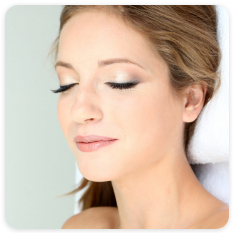Chemical Peels
Chemical peels, also known as chemexfoliation or derma-peeling, are a technique used to improve the appearance of the skin. In this treatment, a chemical solution is applied to the skin, which causes skin to exfoliate or peel off. The new, regenerated skin is usually smoother and less wrinkled than the old skin.* The new skin also is temporarily more sensitive to the sun.
The following chemical peels are performed at
Dermacare Medical PC:
Glycolic acid peel 30%-60% concentration
Lactic acid peel 30%-60% concentration
Salicilic acid peel 30-50% concentration
Lacti-bright peel
Light Jessner's peel
Jessner's peel
Ultra Jessner's peel
What Conditions Do a Chemical Peel Treat?
Chemical peels are performed on the face, neck or hands. They can be used to:
Reduce fine lines under the eyes and around the mouth*
Treat wrinkles caused by sun damage, aging and hereditary factors*
Improve the appearance of mild scarring*
Treat certain types of acne*
Reduce age spots, freckles and dark patches due to pregnancy or taking birth control pills (Melasma)*
Improve the look and feel of skin that is dull in texture and color*
Areas of sun damage, which may contain pre-cancerous keratoses that appear as scaly spots, may improve after chemical peeling.* Following treatment, new pre-cancerous lesions are less likely to appear.*
However, lax skin and more severe wrinkles do not respond well to chemical peels. They may require other kinds of cosmetic procedures, such as Botox, soft tissue fillers (such as Juvéderm or Radiesse. In very sever cases only a plastic surgery may be helpfull.* Please schedule a free consultation with Dr. Yagudin to determine the most appropriate type of treatment for your case.
Who Is a Good Candidate For a Chemical Peel?
Generally, fair-skinned and light-haired patients are ideal candidates for chemical peels. Darker skin types may also have good results, depending upon the type of problem being treated. *
How Are Chemical Peels Performed?
The skin is thoroughly cleansed with an agent that removes excess oils and the eyes and hair are protected. One or more chemical solutions, such as glycolic acid, trichloroacetic acid, salicylic acid or lactic acid are applied to small areas on the skin. These applications produce a controlled wound, enabling new, regenerated skin to appear.*
Preparing for a Chemical Peel
Prior to the chemical peel, your doctor may ask you to stop taking certain drugs and prepare your skin with topical preconditioning medications such as Retin-A, Renova, or glycolic acid. During your first free consultation Doctor will collect your complete medical history and will evaluate type of your skin problem and establish plan of treatment. If you are prone to cold sores Doctor might prescribe antiviral medication such as Valtrex 3-5 days before starting procedure since any skin manipulation on a face may induce a new flare up. *
What to Expect During the Procedure
During the procedure, most patients experience a warm to somewhat hot sensation that lasts about five to ten minutes, followed by a stinging sensation. Cool compresses or hand held fan may be used to help alleviate this stinging. *
What to Expect After the Chemical Peel
Depending upon the type of chemical peel, a reaction similar to sunburn occurs following the procedure. * Peeling usually involves redness, followed by scaling that ends within three to seven days. Mild peels may be repeated at one to four-week intervals until the desired clinical effect is achieved.*
You will work with Doctor to determine what kind of peel is best for you.* This joint decision can vary, depending upon the condition of your skin and the objectives of treatment.*
It is important to use a broad-spectrum sunscreen SPF 60 or above daily and gentle moisturizer to avoid complications. You can obtain these professional skin care products in our office.
What Are the Possible Complications of Chemical Peels?
In certain skin types, there is a risk of developing a temporary or permanent color change in the skin. Taking birth control pills, subsequent pregnancy or family history of brownish discoloration on the face may increase the possibility of developing abnormal pigmentation.*
















